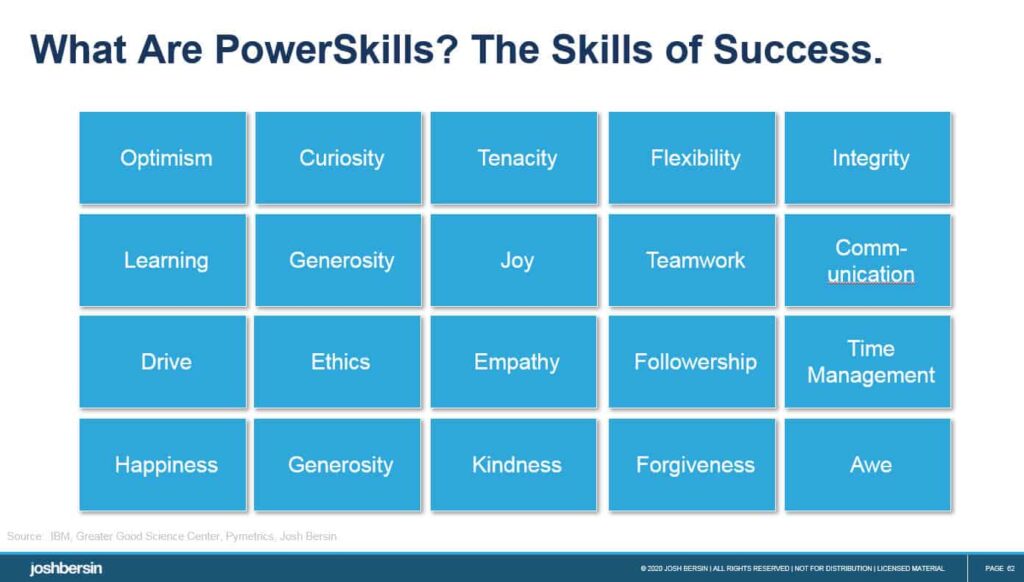
All around the world, various aspects of how businesses are run and how employee development is managed in organizations are changing constantly. This is not a revolution: this is an evolution of business culture, which has accelerated recently. The business evolution is clearly visible in how employers’ expectations concerning the desired employee competencies have changed. The so-called soft skills are on top: among them, communication, cooperation, and decision-making skills. Behavioral skills are so essential in the corporate world that they have recently acquired the name of PowerSkills. At HCM Deck, we call them “company-wide” skills.
Why is empathy or curiosity so important? Why are they no longer “soft”, but “power” skills?
Skills in the past and today
For years in the past, what mattered most was technical competency – hard skills. Along with the changes in business management and communication styles, soft skills have gained importance. Nowadays, as PowerSkills, they are actually the key skills in organizations.
The labor market rewards interpersonal skills most. In the US, in the past three decades, the number of jobs that require a high level of social interactions has increased by almost 12 percentage points. In fact, research from Harvard and Stanford universities reveals that jobs with high social skill requirements have seen larger salary growth than others.
PowerSkills is a term coined by Josh Bersin already in 2019. As he says on his website:
Hard Skills are soft (they change all the time, are constantly being obsoleted, and are relatively easy to learn), and Soft Skills are hard (they are difficult to build, critical, and take extreme effort to obtain).
Bersin gives an IBM study as an example, in which executives indicated hey competencies of their employees for the future. The overwhelming majority of them are behavioral. According to Bersin, the study suggests that hard skills can be… bought. It’s the soft skills that are so hard to obtain.
PowerSkills and the pandemic
In his latest report, Josh Bersin mentions that after the pandemic we all agree how important PowerSkills are. Apart from empathy, Bersin lists humility, forgiveness, and other skills that are really inspiring, as they show how much we all need support from each other as well as a new approach to employee integration and teambuilding. However, the competencies needed differ, depending on the organization.
PowerSkills are success skills
Surely, some people still believe that “soft” skills are some sort of inborn talents or something that everyone can do. This isn’t true, but we may differ when it comes to potential. However, such qualities as the ability to adapt, innovative thinking, or creativity are necessary skills that determine success these days.
For a great source of inspiration and knowledge on how to shape modern skills, take a look at the publications and speeches of Brene Brown. She is an American researcher who writes and talks about how to turn vulnerability into power; about being courageous in life and at work; and about embracing one’s sensitivity and mistakes to find true power and courage. As Brown says, “there is no innovation and creativity without failure.”
How do PowerSkills change business in practice?
Josh Bersin writes about his talk on skills with Victoria Roberts, the head of HR for Truckstop.com. She has taken the company to a new level of performance by focusing on relationships, increasing employees’ self-knowledge, authenticity, and empathy for customers and the team. In two years, by concentrating on the development of PowerSkills, she has completely changed the organizational culture, which resulted in higher employee engagement and retention.
In this context, the power of the skills mentioned by Bersin comes to the fore: kindness, forgiveness, and tenacity. Other skills enumerated by him include generosity, awe, and happiness. These words sound so fresh and friendly! We may wonder what sparked off the emergence of such humanist values and qualities in the world of business, but what is most relevant is how to apply them in practice for ethical business built by people with a high level of PowerSkills.

Other important PowerSkills are:
- self-management,
- resilience,
- critical thinking,
- responsibility (for your own actions as well as your team’s actions),
- focus and attention.
Coaching is a great tool to develop them.
Modern business introduces modern values. A stable and predictable environment and fixed patterns of behavior are history now. Growth, innovativeness, agility, and change all depend on other values: kindness, generosity, trust, and awe. People and their relationships guarantee engagement, which leads to better performance and business development. Enhancing PowerSkills is the key to the future.

